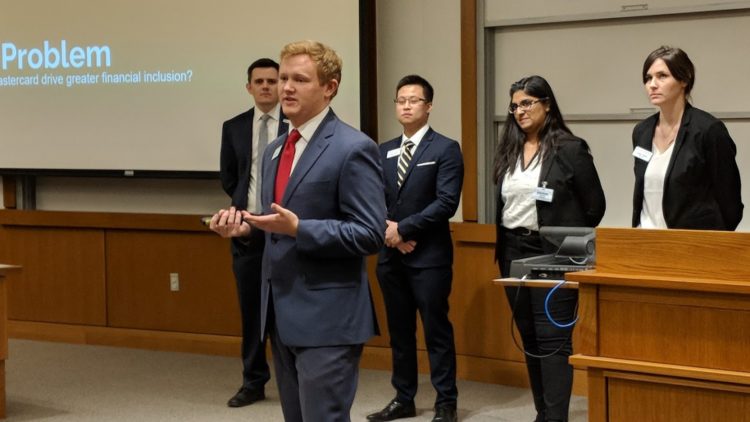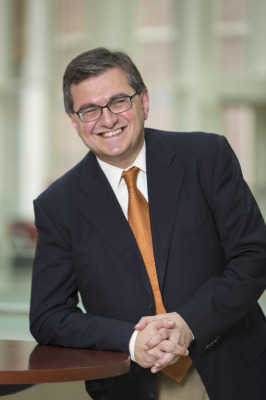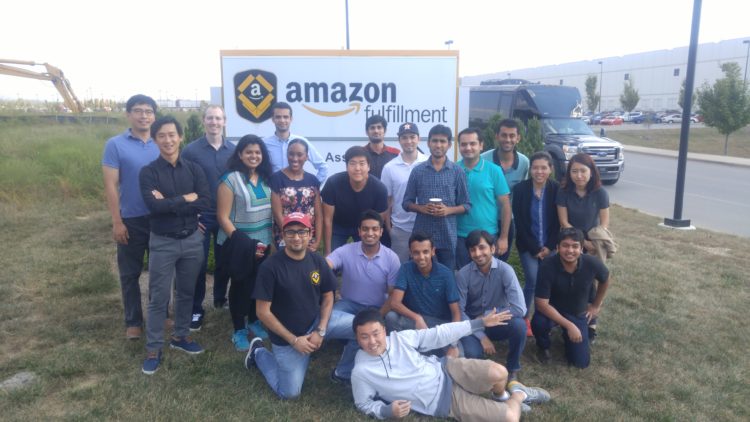For Mike Bynum, MBA ’19, the final celebration of ICE Week on Wednesday afternoon was both exhilarating and bittersweet.
After a grueling, five-day marathon of case descriptions, business research, preparation, and case presentations, he was happy to have a plate of hot food and a drink in his hand, surrounded by his classmates and the three members of his team—his partners for the entire semester.
“But it’s also a little nostalgic,” he said. “I’m realizing that I’m working with the team one last time. We had gotten into a rhythm.”
Bynum and more than 140 other first-year MBA students participated in ICE Week—short for “Integrated Case Experience”—from Friday through Wednesday, a 17-year tradition at Olin. After final exams and before departing for winter break, the students put their heads together, solving real-world problems for real Olin business partners.
Disrupting partner businesses
This year, Monsanto and Amazon paired for one deceptively simple, yet agonizingly complex case: Disrupt Monsanto’s business using Amazon’s natural language processing and artificial intelligence in marketing and customer strategy. Presented on Friday, students worked through the weekend toward their Monday presentations.
Monday afternoon, MasterCard came to the plate with a second challenge: Propose products or services that would effectively increase the demand for digital money and open opportunities for largely cash-based customers to participate in the financial system. With only Tuesday to prepare, students gave their presentations Wednesday morning and early afternoon.
Patrick Moreton, Olin’s senior associate dean for graduate programs, said the five-day competition is a chance for students to step outside the somewhat artificial realm of the cases they’ve seen in the classroom.
“Classroom cases are more retrospective. They’re an effective teaching technique, but they’re not the real world,” Moreton said. “We bring in the outside companies so the stakes are higher. This is a chance for students to work on the kind of problems you might get at work.”
For the students, those “high stakes” include knowing they’re essentially auditioning for some top employers looking to fill summer internships. The partners get to see Olin students in action, gauging their analytical and presentation skills. Moreton urged the more than two dozen judges to consider a simple question as they evaluated the presentations: Could I give it to my boss without changing it? That might be a perfect presentation.
Corporate benefits
For the partners, it doesn’t hurt that they get 30 sets of eyes offering new perspectives and fresh insights on their business. Even if one presentation doesn’t jump out, the aggregated effect of multiple team presentations could uncover new ways of considering their problems.
For Monsanto, student ideas to “disrupt” its business included:
- A software platform to aggregate farmers’ field data, Monsanto proprietary data, and third-party information to customize recommendations for farmers as they planned their annual seed and supply orders.
- A user-generated social networking platform for farmers to share best practices using artificial intelligence to integrate ideas with outside data and elevate the most promising suggestions.
- Another software platform using field and laboratory data to transition Monsanto away from corn and soy products—which largely support crops that provide feed for animals—to a business that moves toward more vegetable-based diets and lower protein diets.
Student suggestions for MasterCard included a plan to test an expansion of point-of-sale devices at retail locations in Mexico to expand the capacity of card-based cashless commerce and a proposal to reduce or eliminate digital payment fees to incentivize merchants to encourage them.
Winners
ICE Week organizers and the corporate partners raved about the high quality proposals they saw from students in both cases. They selected a runner-up and a winning team for both cases and a “best of show” team for the overall competition. Winners get a chance to make their presentations at Monsanto and MasterCard in front of senior leadership, as well as tour the companies and learn more about the business.
Monsanto case winners also got an Amazon Echo.
Monsanto-Amazon Case: Kavon Javaherian, Neha Lankadasu, Kyle Lee, Ana Mihaila (runners-up); Camden Civello, YoonJin Hwang, Takashi Otsuka, Meredith Owen (winners).
MasterCard Case: Camden Civello, YoonJin Hwang, Takashi Otsuka, Meredith Owen (runners-up); Greg Brown, Maitrayee Goswami, Junho Kim, David Paquette, Ariel Washington (winners).
Overall Winners: Greg Brown, Maitrayee Goswami, Junho Kim, David Paquette, Ariel Washington.







